 AS STEAM pipes click in colder
weather, we of the Church also need to make noise as we warm and focus our attention. This
week the text used in celebration of the Baptism of Our Lord, provides us with
new fire from the Gospel According to Saint Luke, as a centering message concerning
mission. We read...
AS STEAM pipes click in colder
weather, we of the Church also need to make noise as we warm and focus our attention. This
week the text used in celebration of the Baptism of Our Lord, provides us with
new fire from the Gospel According to Saint Luke, as a centering message concerning
mission. We read...
As the
people were in expectation, and all men questioned in their hearts concerning
John, whether perhaps he were the Christ, John answered them all, “I baptize
you with water; but he who is mightier than I is coming, the thong of whose
sandals I am not worthy to untie; he will baptize you with the Holy Spirit and
with fire. His winnowing fork is in his hand, to clear his threshing floor, and
to gather the wheat into his granary, but the chaff he will burn with
unquenchable fire.”
So, with many other exhortations, he preached
good news to the people. But Herod the tetrarch, who had been reproved by him
for Herodias, his brother’s wife, and for all the evil things that Herod had
done, added this to them all, that he shut up John in prison.
Now when all the people were
baptized, and when Jesus also had been baptized and was praying, the heaven was
opened, and the Holy Spirit descended upon him in bodily form, as a dove, and a
voice came from heaven, “Thou art my beloved Son; with thee I am well pleased.”
(Luke 3:15-22)
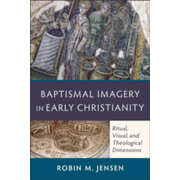 |
Baptismal Imagery in Early Christianity: Ritual, Visual, and Theological Dimensions - eBook By Robin M. Jensen |
Water and
More…
Our author tells of an important happening in the life of
Jesus. Under his supervision, Luke is thought as responsible for the writing of this gospel, and also the book that we entitle “The Acts of the
Apostles”. Thought by historians that he was a Greek physician in nationality
and trade, Luke was likely influenced in theology by Saint Paul, who was his
contemporary and friend. By this knowledge, we see the works written here carry some of the
fire expressed by Paul’s evangelical spirit. However, as we are doused with
healing waters... and feel the warmth of these hot stones for our healing, Luke’s words carry
a course of treatment for those of us who are harried souls.
Being a physician by
knowledge and trade, many biblical authorities view Luke as an historical witness who
sought exactness in the telling of this account. Living remote from
the many regions talked about in the text, our author made full the universal symbolic use of
both water and fire. In ancient cultures, the meanings contained in water went
far beyond element and physical energy we often take for granted in modern society.
First, in the ancient
world we know that water was basic and a required element for human
survival. Assuming that several millennia ago the Middle East was either arid
or desert geography, water’s involvement in life was noted as most assuredly needed. The need was first met with the
deliverance of a child… as a woman’s water broke just prior to giving birth.
Water was seen therefore as a life-sustaining mystery. Ancient flood stories such
as the saga of Noah’s ark... subsequently held very deep meanings. Water was also highly regarded as
a needed substance for cleansing persons or objects.
Tribal civilization gathered around streams called “wadi” in the ancient Hebrew language. Stream water gave them life’s meat as game would come to drink and be gotten, or fish could be caught. The proper use of water for washing purification often proved to keep demons of illness at bay. However, water was seen as ambiguous and transformative... for it could be beneficial in one sense but deadly when agitated. Indeed a person could drown falling from a boat, to be mysteriously claimed by a sea serpent or its denizens. Still others would be washed away in sudden flash floods. History reveals, to a greater degree than ourselves, the ancient people had a love-hate relationship with water. The very nature of the element seemed supernatural to them.
Tribal civilization gathered around streams called “wadi” in the ancient Hebrew language. Stream water gave them life’s meat as game would come to drink and be gotten, or fish could be caught. The proper use of water for washing purification often proved to keep demons of illness at bay. However, water was seen as ambiguous and transformative... for it could be beneficial in one sense but deadly when agitated. Indeed a person could drown falling from a boat, to be mysteriously claimed by a sea serpent or its denizens. Still others would be washed away in sudden flash floods. History reveals, to a greater degree than ourselves, the ancient people had a love-hate relationship with water. The very nature of the element seemed supernatural to them.
Tribal holy persons would attempt to appease the water gods such as the storm god Ba’al, who
was accompanied by Astarte and Tannit (named goddesses known by description
who were simply thunder and lightning). The priests would pay homage to this entourage by
drowning children to make the storm go away. Later through baptism, a cleansing ritual involving water,
they acted to symbolically “kill” and give “rebirth” as payment to the nature deity for gaining escape from tribal sin.
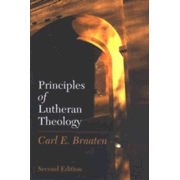 |
Principles of Lutheran Theology Second Edition By Carl E. Braaten |
Baptism and cleanliness thus was a desert tribe's method to petition s a nature god’s bestowing forgiveness and favor. They would petition for relief. In Israel, who were a people born from the geographic region ruled by the nature gods Ba’al and Marduke, inherited the habit of trying to keep their harsh god at bay through such washings. This they showed before Jehovah, who eventually became their God, and they begged for relief from their sins. They wanted to keep the demons and death at bay for another season of growth. However, as the life cycle of Hebrew tribal members proceeded, a person died as they aged and their personal water dried up. They returned to the dust. Water, as you can see, was and still is a precious commodity.
Israel developed amid
these nature god cultures and shared the baptismal rituals. Therefore they used water washing as
purification for themselves and objects within their culture. Within the ancient
scriptures we find that Hebrews coveted water access, such as Jacob’s well, for
supporting the life of their livestock and themselves. They used water for
personal and ritual cleansing. The observance of many of ritual washing laws
within the Old Testament are proofs of its importance among Jewish people. In the subsequent ministry of
John the Baptist then.., we find that repentant persons in Israel sought God’s favor
through the application of water, as bathed by the waters of the Jordan
River. Thus the people annually received forgiveness and were cleansed.
The site of the Jordan was indeed meaningful. You see, John’s baptism was offered to the crowd gathered at the Jordan. The river was the one through which the people of Israel had passed to be cleansed and granted the promised land. John’s baptism was therefore a re-dedication meant to return the Jews as clean in body and the soul. Through the ritual, John wanted to provide the children of the ancestor Israel with a new beginning… freeing persons at least temporarily from being slaves to their burdens.
The site of the Jordan was indeed meaningful. You see, John’s baptism was offered to the crowd gathered at the Jordan. The river was the one through which the people of Israel had passed to be cleansed and granted the promised land. John’s baptism was therefore a re-dedication meant to return the Jews as clean in body and the soul. Through the ritual, John wanted to provide the children of the ancestor Israel with a new beginning… freeing persons at least temporarily from being slaves to their burdens.
However, as Luke writes of the tradition we see that though similar action the baptism of Jesus
was quite different. Luke tells us that John stressed that he was to baptize Jesus... a person who would also baptize. John had said that Jesus was the one who was greater than he, and thus was to be
ministering more highly after him. Jesus, his cousin… was a person who would baptize “with the Holy Spirit and
with fire”.
We see that in doing ritual washing, John baptized God's only begotten Son, who had no sin. Jesus thus endured the
ancestral piety of baptism so that all lawful requirement would be fulfilled for those
who would claim him. You see, from the beginning, Jesus Christ was intended to
take our place. Jesus grew into the knowledge that he must provide salvation to his
disciples and those who would follow their witness. This was Luke’s message to
the churches in his region and beyond.
Heated Witness!
However, here we also see that Luke introduced the
element of fire into the reader’s mind. Fire also existed as a powerful element of
spiritual action. As with water, fire had an ambiguous relationship with human
beings. The fire that was kindled at our Lord’s baptism was sparked in
preparation for what would be presented later… during the heated flaring at
the Feast of Pentecost. We are reminded that written under Luke’s pen, the
account of that later spiritual event was recorded in the Acts of the Apostles. At Pentecost, the feast of
fifty days, flames of fire were described as seen above the heads of the
apostles as they taught concerning Jesus’ death and his subsequent
Resurrection.
However, we know that while on the one hand fire can warm,
and on another hand it can scar and kill. For Luke’s audience it would do
as such. As symbolized by “tongues of fire” given at Pentecost, the hard-to-hold
power of fiery witness was used by God to grow the Church. Fire cauterized the wounds caused
by Jesus’s death, thereby empowering new participants with the knowledge of the
Resurrection. As well, the flaring heat of Christian evangelism carried out from the scene brought horrible
heat to the doorsteps of the disciples… even to their being burned alive in the stadiums
of Rome.
 |
Abolishing Abortion: How You Can Play a Part in Ending the Greatest Evil of Our Day - eBook By Rev. Frank Pavone |
Water and Fire Combined!
Today, we note as described by Luke, a
specific... seeming impossible sequence of events occurred as Jesus was baptized. First, a
substitution was made by our Infinite God and finite man. After Jesus
the Son of God was baptized, he willingly took a believer's place. H died to free us from our death sentence... so that we may be
saved. Then he descended into the hellish lake of fire. From that fiery realm… he again did the miraculous. He arose again… and now sits in glory at the right hand of the Father. Today then, we recite in the Creed that from that heavenly realm he shall judge the living and the dead.
We also note that in words Luke portrayed our
Lord as being baptized for our forgiveness, and then Jesus prayed. This prayer is not mentioned in the other two synoptic gospel accounts. In
only Luke then, as Jesus prayed, a dove was described as having descended upon him. Was
this a sign that his substitutional saving of believers and giving of his life
in mission... was accepted by the Father? I rather think so.
In this self-giving love, we read that the pattern was set for the baptismal practices of our Lord’s early churches. I consider that in this, the Father is well pleased. You see for Luke, baptism contained two features that he passed along to his readers. First, as faith communities they needed to rightly communicate that Christian baptism was not just a work of repentance that we as a people must do. Rather than a ritual purification which needed to be done annually, baptism was to be understood as an unchanging, once-in-a-lifetime sacred event. Baptism is not done by us, therefore, but by God. Baptism is accomplished by God through Jesus Christ, and presided over by the Holy Spirit. Again, I repeat… baptism is not done by the power of the baptizer, nor the baptized! Baptism is an eternal, sacred event that is not to be repeated. This also means that any pastor or person who baptizes simply provides a functionary role, providing only ritualistic movement as the candidate being baptized is overwhelmed and cleansed by water and the Holy Spirit.
In this self-giving love, we read that the pattern was set for the baptismal practices of our Lord’s early churches. I consider that in this, the Father is well pleased. You see for Luke, baptism contained two features that he passed along to his readers. First, as faith communities they needed to rightly communicate that Christian baptism was not just a work of repentance that we as a people must do. Rather than a ritual purification which needed to be done annually, baptism was to be understood as an unchanging, once-in-a-lifetime sacred event. Baptism is not done by us, therefore, but by God. Baptism is accomplished by God through Jesus Christ, and presided over by the Holy Spirit. Again, I repeat… baptism is not done by the power of the baptizer, nor the baptized! Baptism is an eternal, sacred event that is not to be repeated. This also means that any pastor or person who baptizes simply provides a functionary role, providing only ritualistic movement as the candidate being baptized is overwhelmed and cleansed by water and the Holy Spirit.
Second for us is that while functioning in the Word
as vehicles of the Holy Spirit, both the pastor and congregation participate in
fervent prayer for those being baptized. This is in keeping with the pattern
laid down by Luke, in showing that Jesus prayed. The baptized and gathered
congregation are rightly presented as living then in the warmth of the healing
“fire” of the Spirit. Being Spirit empowered, they all are raised up with
the baptismal candidate to provide the Word and healing for others out in the
world.
Consequently, I consider that Luke presented
the early Church with this sound basis for baptism. Baptism was more than a ritual, but a gift to be administered freely by God to those who would repent. It made no account of age, race, sex or
station in life. How important is the institution of Baptism? Very! Even so it
is that we have contested with one another over the Baptism of children for
centuries. The gospel message was spoken, repentance sought, and Baptism was
offered. In the instance of children who could not yet speak, the parents of
the child would promise that they accepted the responsibility of teaching the
baptized infant repentance and the way of the Lord.
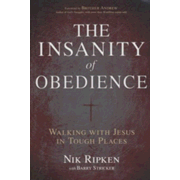 |
The Insanity of Obedience: Walking with Jesus in Tough Places By Nik Ripken with Barry Stricker |
The book of Acts written by Luke, testifies
that the disciple Philip baptized an Ethiopian court official while traveling
on the road toward Gaza. The two men simply pulled the chariot over after
Philip’s teaching… and the Baptism of the man occurred according to the Holy
Spirit. While I, like many clergy, prefer to perform this Sacrament amid the
congregation gathered, we as Christians may also rightly baptize in the Spirit using water, any
amount of water… whether that water is sprinkled, dripped, dunked or sprayed on
an adult or child! In discussion, I have claimed that if sudden death was
expected, that my loving God would honor Baptism using any water available and
blessed… even the spit from the baptizer’s mouth. By invoking that we baptize in
the name of God, as stated to be “the Father, and the Son, and the Holy Spirit… we who
baptize stand on no merit of our own. We just do the precious deed… and are privileged to see
a sacred instruction fulfilled.
Whenever doing so, however, we need to remember and remind each other that it was Jesus who was baptized by John for our sake, who died that we might live, who was raised that we may see eternal life, who sent his Spirit into the world so that his Church should have the water and fire of witness.
The act of Baptism is sacred!
In the Gospel According to Saint Matthew, Jesus gave his Church the mandate to
go into all nations and baptize in his the name of the Father, the Son and the
Holy Spirit. We who have been called forth in our Baptism into Christ are thus
sent in turn to… preach the Word, Baptize, pray, and heal others. As the modern
Church committed and empowered by the Holy Spirit then, we are to do these things and increase in our numbers until that last day when our Lord shall come again. Consequently, let
us be alive and energized in the Holy Spirit! May we be empowered to go this
Sunday from our hearing about this celebration of divine love… to once again do
as we were instructed. Thanks be to God.
May the Peace of God Be With You Always!

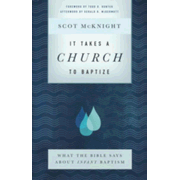
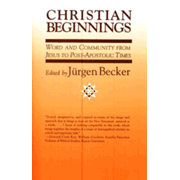
No comments:
Post a Comment